It is impossible to overestimate the significance of call tracking measures. These metrics offer insightful information on conversion rates, call length, call sources, and customer behavior. Businesses may improve their marketing tactics, more efficiently use their resources, and ultimately get a higher return on investment by comprehending these data points.
Why would you track calls? The useful information obtained from call tracking metrics holds the solution. Businesses may determine, for example, which ads or phrases are getting prospective consumers to pick up the phone. Furthermore, call tracking can highlight patterns in client inquiries, enabling companies to better target their products and services and enhance customer satisfaction.
Understanding Call Tracking
Businesses looking to enhance client relations and optimize their marketing tactics must comprehend call tracking. Fundamentally, call tracking is monitoring and analyzing incoming phone calls using specialized tools such as call tracking software or a call tracking app.
Using call tracking numbers is one of the main elements of call tracking. These are distinct phone numbers linked to various marketing initiatives or platforms. Businesses may determine which internet platforms or adverts are driving phone calls by allocating special numbers to them. For example, if a company advertises on search engines and social media, utilizing separate call tracking numbers for each platform might show which one generates more phone calls.
Metrics related to call tracking provide crucial information. Conversion rates, call durations, and call sources are all covered by these measures. Businesses may ascertain, for instance, how many calls result in a transaction or an appointment being made. Call tracking data can also provide insight into consumer behavior, including the times of day when the majority of calls are placed and the locations of the callers.
Why Are Call Tracking Metrics Important?
Call tracking metrics provide quantifiable data on call performance and customer interactions. By analyzing these metrics, businesses can:
- Understand customer preferences and pain points.
- Measure the effectiveness of call tracking services and marketing campaigns.
- Allocate resources more efficiently.
Purposes of Tracking Calls
To see how important tracking calls are in modern business, you should know why people do it. Evaluating how well marketing activities are working is one of the main goals. Call tracking services help businesses figure out which ads or campaigns get potential customers to call. In this case, website call tracking lets a company know if a customer came to their site from a certain online ad and then called them.
One more important goal is to improve help and customer service. Inbound call tracking lets businesses learn more about questions, worries, or comments they get over the phone. The information in this article is very helpful for making contact better and making sure that customer needs are met quickly and correctly.
Also, keeping track of calls helps with allocating resources. Businesses can better use their money and resources if they know which marketing outlets or efforts bring in the most calls. If, for example, a certain advertising channel regularly brings in a lot of calls but not many sales, changes can be made to improve the campaign, or resources can be moved to channels that work better.
A Review of Top Call Tracking Software Providers
This review will look at some of the top call tracking software providers, highlighting their key features and how they can enhance call tracking marketing strategies.
1. Phonexa
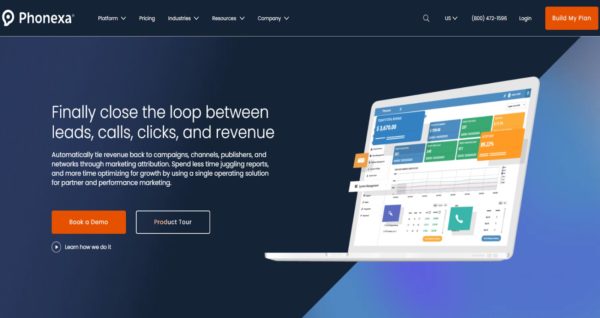
Phonexa is a robust call tracking solution that offers a range of features. Phonexa includes call analytics, call recording, and real-time reporting, which can be very helpful for businesses looking to keep a close eye on their call center tracking software. The system also offers IVR (Interactive Voice Response), which can improve customer service by routing calls to the appropriate department. Phonexa also provides a click-to-call feature, making it easier for potential customers to reach out.
Key Features:
- Dynamic Call Tracking: Assigns unique phone numbers to each marketing campaign to determine which ones are driving the most calls.
- Robust Analytics: Offers detailed insights into caller demographics, call duration, and call sources.
- Lead Management: Provides tools to effectively manage and distribute leads to appropriate teams.
- Integrations: Seamlessly integrates with various CRM and marketing platforms for enhanced functionality.
- Scalability: Designed to grow with businesses, accommodating increasing call volumes and needs.
2. LeadsPedia
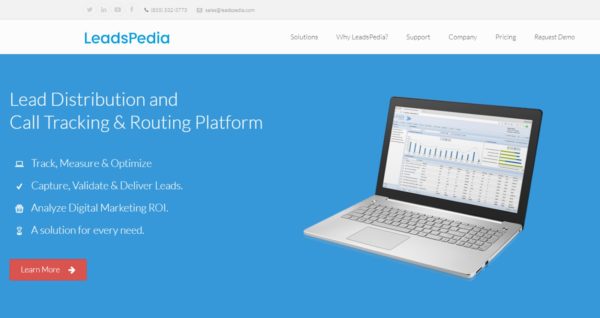
A top call tracking system is LeadsPedia. Businesses trying to maximize their sales call tracking might use LeadsPedia because of its unique features for affiliate management and lead distribution. Businesses may get important insights into their call tracking marketing using LeadsPedia’s real-time reporting and analytics features. A cost-effective solution for small organizations or those just getting started with call tracking, LeadsPedia also offers a free call tracking option.
Key Features:
- Multi-Channel Tracking: Tracks calls across different marketing channels, including online and offline campaigns.
- Real-Time Reporting: Delivers immediate data on call performance, helping to make informed decisions quickly.
- Affiliate Management: Enables businesses to manage and optimize their affiliate marketing efforts efficiently.
- Customizable Dashboard: Allows users to tailor the dashboard to display the most relevant metrics and data.
- Compliance Tools: Provides features to ensure that call tracking adheres to regulatory requirements and standards.
3. Invoca
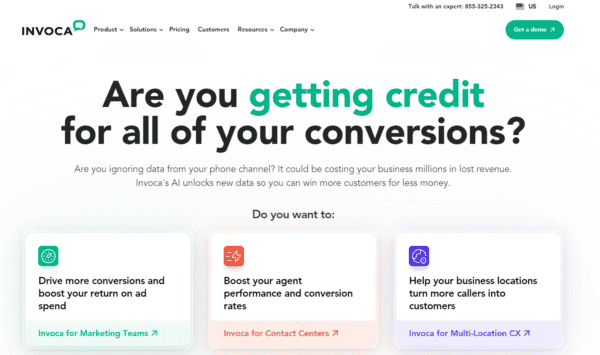
Analytics call tracking is the main emphasis of Invoca’s potent call tracking solution. Businesses may gain vital insights into their marketing initiatives with the help of Invoca’s real-time analytics and reporting. Invoca also has capabilities that assist firms in enhancing sales call tracking and customer service, such as call recording and rating.
Key Features:
- AI-Powered Insights: Utilizes artificial intelligence to analyze call data and provide actionable insights.
- Call Routing: Directs calls to the most appropriate agents or departments based on predefined rules.
- Voice Analytics: Transcribes and analyzes call recordings to identify trends, keywords, and customer sentiments.
- Integration Capabilities: Offers extensive integrations with CRM, marketing platforms, and other business tools.
- Campaign Optimization: Helps optimize marketing campaigns by identifying which strategies generate the highest quality calls.
4. CallFire
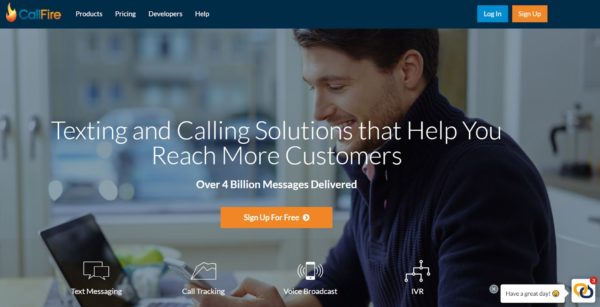
A straightforward yet efficient call tracking system is offered by CallFire. Local or toll-free numbers, call recording, and real-time reporting are important features. To further enhance its call tracking marketing capabilities, CallFire also provides a text message solution. It’s a wonderful choice for companies on a low budget because it’s one of the carriers that offers free call tracking.
Key Features:
- Easy Setup: Provides a user-friendly interface that simplifies the process of setting up call tracking.
- SMS Marketing: Offers SMS capabilities, allowing businesses to reach customers through text messaging.
- Auto-Responders: Automatically sends pre-recorded messages or responses to callers based on specific triggers.
- Call Recording: Records calls for quality assurance, training, and compliance purposes.
- Affordable Pricing: Offers competitive pricing plans suitable for businesses of all sizes.
5. Mango Voice
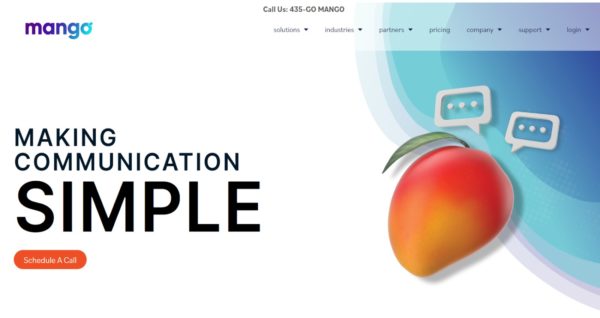
Mango Voice has an incredibly feature-rich and user-friendly call tracking solution available. Analytics, real-time reporting, and call recording are all included. The ability for organizations to customize the system to meet their unique needs is one of its most notable features—custom integrations. Mango Voice is an excellent option for companies searching for complete call center tracking software.
Key Features:
- VoIP Solutions: Provides Voice over Internet Protocol (VoIP) services, enabling clear and reliable call quality.
- Unified Communications: Integrates voice, video, and messaging into a single platform for streamlined communication.
- Mobile App: Offers a mobile application that allows users to make and receive calls on the go.
- Customizable Features: Allows businesses to customize features and settings to meet their specific needs.
- 24/7 Support: Provides round-the-clock customer support to assist with any inquiries or issues.
6. CallAction
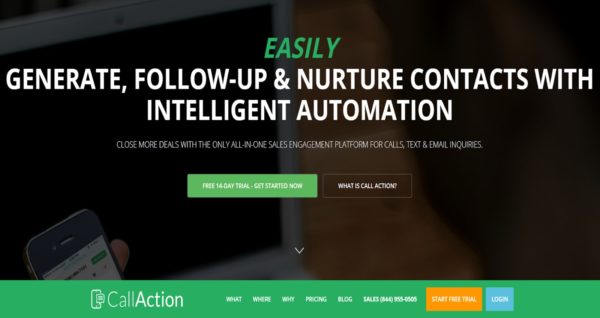
Marketers love CallAction because it’s a feature-rich call tracking tool. Lead capture, text message marketing, and call tracking marketing capabilities are just a few of its many important functions. Users may connect their call tracking information to their customer relationship management system (CRM) by using the software’s CRM connection option. CallAction is an inexpensive choice for companies wishing to investigate the advantages of call tracking because it also provides a free call tracking trial period.
Key Features:
- Lead Capture: Captures and tracks lead from various sources, including phone calls, texts, and online forms.
- Automated Follow-Ups: Sends automated follow-up messages or emails to leads to nurture relationships.
- Call Routing: Routes calls to the appropriate agents or departments based on predefined criteria.
- Integration Capabilities: Integrates with CRM systems, marketing platforms, and other third-party tools.
- Performance Analytics: Offers analytics and reporting tools to measure the effectiveness of call tracking campaigns.
7. CrazyCall
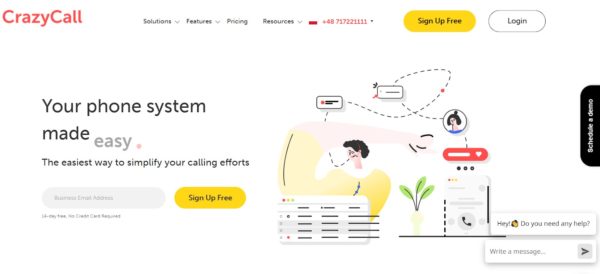
This call center tracking software is designed to provide comprehensive sales call tracking solutions. CrazyCall key features include an intuitive interface, easy setup, and powerful analytics. CrazyCall’s analytics call tracking feature allows users to track and analyze calls, helping them make data-driven decisions. Furthermore, the software offers a feature that records calls, which can be beneficial for training and quality assurance purposes.
Key Features:
- Browser-based Calling: Enables users to make and receive calls directly from a web browser, eliminating the need for additional hardware.
- International Numbers: Provides access to international phone numbers, allowing businesses to expand their reach globally.
- Team Collaboration: Facilitates team collaboration through features like call transfers, conference calling, and shared contacts.
- Call Queues: Manages call queues efficiently, ensuring that callers are attended to promptly and professionally.
- Affordable Plans: Offers cost-effective pricing plans with flexible options to suit different business needs.
8. JustCall
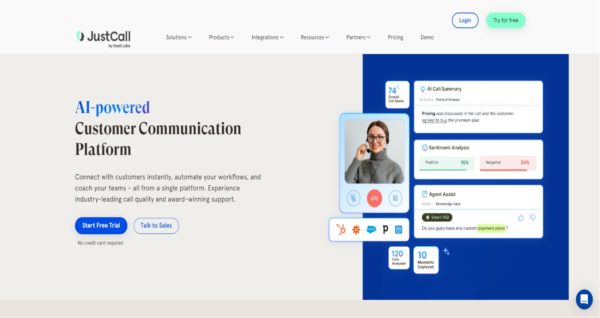
This sales call tracking software is known for its simplicity and effectiveness. Key features include international calling, SMS marketing, and advanced call routing. JustCall’s advanced call routing feature ensures that calls are directed to the right department or individual, improving customer service. The software also offers a call tracking online feature, allowing users to track and manage calls from anywhere.
Key Features:
- Click-to-Call: Allows customers to initiate calls directly from a website or app with a single click.
- Call Recording: Records calls for monitoring, training, and compliance purposes.
- CRM Integration: Seamlessly integrates with popular CRM systems to enhance customer relationship management.
- Voicemail Drop: Enables users to leave pre-recorded voicemails, saving time and ensuring consistency.
- Global Coverage: Provides access to local and toll-free numbers in numerous countries, making it suitable for international businesses.
Conclusion
If companies want to maximize their marketing budgets and improve customer service, they must make the most of call tracking technologies. With so many call tracking options at their disposal, companies may select the finest call tracking software to meet their unique requirements and goals. Call tracking data may help organizations obtain valuable information, make well-informed decisions, and ultimately succeed more in their activities.
 Gearfuse Technology, Science, Culture & More
Gearfuse Technology, Science, Culture & More


